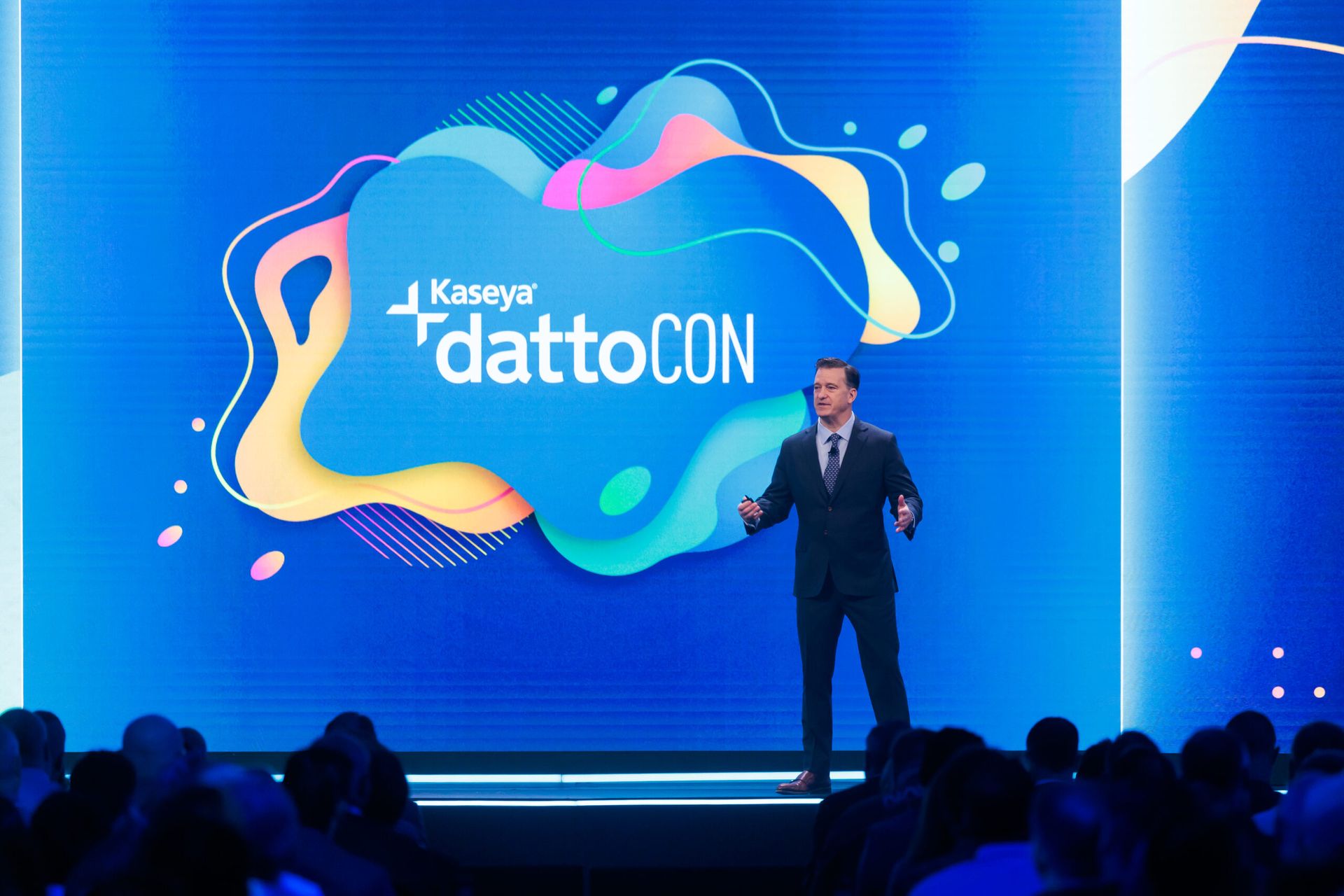- Former Continuum CEO Michael George is replacing Emily Glass as CEO of MSP platform company Syncro.
- George was an advisor to Mainsail Partners when they made their initial investment in Syncro in 2020.
- George believes the big four MSP platform companies have stopped innovating and the market is ripe for disruption.
- George wants to invest in automation and AI to innovate at Syncro, and has rehired much of his Continuum automation and AI engineering team to work for Syncro.
- Syncro will also introduce new cybersecurity elements to its platform in the first half of 2024.

Former Continuum CEO Michael George will take the helm of Syncro as CEO, the company announced on February 27. Syncro offers a cloud-based PSA and RMM platform for MSPs.
The announcement was the other shoe dropping after now-former Syncro CEO Emily Glass announced in a LinkedIn post last week that she would leave the company.
The work to bring Michael George aboard as CEO was months in the making, and his connection to the company goes back years. ChannelE2E caught up with George to talk about his new role, what’s going on in the MSP platform market now, and his plans for Syncro.
The Backstory: How Michael George Arrived at Syncro
Syncro is backed by a growth equity firm called Mainsail Partners, and some of the investors in Mainsail are the same investors from Summit Partners, another PE firm. Thoma Bravo is the private equity firm that acquired George’s former company, Continuum, from Summit in 2017. George exited Continuum at the end of 2019 when ConnectWise acquired the company.
George knew the investors at Mainsail, and they asked for his opinion about Syncro in 2020 when they were considering investing in the company. (Check out the full backstory of Continuum and George’s leadership of the company and exit here.)
George was impressed with Syncro then, and he shared his thoughts with Mainsail.
“I thought it was a good firm,” George told ChannelE2E. “Even back then when the company was smaller, they had a lot of opportunity. I thought it would be a great investment.”
Fast forward to November 2023. George is the CEO of MSSP-focused cybersecurity vendor Invicti and has been in that role since November 2021. But Syncro approaches George to ask him to serve as one of its board members. Following discussions with Syncro executives about the direction of the company, a decision was made for Emily Glass to step down and for Michael George to step up and into the top job.
Syncro’s Strengths (According to George)
First, George said, “the underlying technology and platform is extraordinary.” Over the past few years, the company has made investments in improving underlying technology – the plumbing. For instance, the company moved to AWS architecture, giving it unlimited scalability. Those investments in "plumbing" improved the platform, but they aren’t usually the kind of improvements that MSPs appreciate in their day-to-day operations.
Second, George said, Syncro has a fabulous team of people – some great professionals and great leadership in the organization.
Third, George said, Syncro has “a great financial partner that’s willing to invest in the business. In the private equity world, that’s not always the case. Some are just trying to capture value. Some are really creating it, and Mainsail [Syncro’s backer] is one of those value-creation firms, so I have an appreciation for that.”
Those three qualities factored into George’s decision to consider the top job at Syncro. But there were also factors in the external market, too.
What the Current MSP Platform Market Lacks: Two Macro Themes
Number one, the market is lacking innovation, George said.
The biggest complaint many MSPs have about the big MSP platform companies now – ConnectWise, Kaseya, N-able, and even NinjaOne -- is that these companies are not innovating anymore. The only way they are growing and adding new products and new features is through acquisition, George said. [Former ConnectWise CEO Arnie Bellini told ChannelE2E the same thing in an interview a few months ago.]
“They’re acquiring, and that’s really just a private equity arbitrage game,” George said. “The big four platform companies that have the lion’s share of the MSP community are run by financial companies that are trying to squeeze every nickel out of what they have as opposed to investing in it.” Plus, these companies are too big to be innovative, to be nimble, and to invest.
“A smaller upstart can come in and completely disrupt this market through innovation – I think the state of this market is extraordinarily favorable for a company like Syncro.”
George added: “We’re not in a late-stage value capture mode, we’re in a value creation mode.”
Number two, Syncro has an opportunity for a new level of automation that can be developed because of some of the AI technologies, models, and methodologies that are now commercially available. This includes advanced algorithms for deep learning and natural language processing and computational power from chip makers like Nvidia to process the massive data sets for training AI models and enable edge computing, reducing latency to enable real-time processing.
Automation and AI were a focus for George back in the Continuum days when the company introduced Intellimon, an intelligent alerting service for its RMM platform and an early entry into the effort to leverage artificial intelligence to improve IT service operations for MSPs. That was before large language models were available to the general public or most companies.
The team that developed Intellimon went to ConnectWise when it acquired Continuum. But within a year the senior AI architect and senior engineering team that had developed Intellimon left ConnectWise. Years later, “they are out of their non-compete agreements, and I’m well past my no-hire agreement,” George said. “I’ve hired the best, the brightest, and the most talented group of people that wrote the underlying automation engine that really powered the growth and success of Continuum. They are now part of the Syncro innovation journey.”
What About Cybersecurity at Syncro?
George is coming to Syncro from a cybersecurity vendor, and he recognizes that to be an “effective and comprehensive MSP today, you have to have a viable security offering as part of your own portfolio.” He pointed out that Continuum was the first MSP company that bet the company strategy on cybersecurity when everybody else was saying, no, this is not an SMB problem. Continuum did a series of acquisitions around security.
George says that Syncro will put some basic pillars in place as a security offering for its MSPs in the first half of 2024. Will that be MDR? Will it be a SOC-as-a-service? It’s still unclear the exact shape these plans and development will take when they are released.
Is Syncro for Sale?
As a CEO who has worked closely with PE backers and has sold previous companies to PE, a looming question for George was whether Syncro’s investors were close to an exit. That could be a good reason to bring in a CEO like George. Mainsail made their investment in Syncro four years ago, in August 2020, and that’s within the three-to-five-year timeframe when a company is likely to be recapitalized.
“That’s not where (Mainsail) is at with Syncro,” George told ChannelE2E. “In fact, if anything, I would put us on the acquiring versus the acquired side of the equation right now. We’re looking more to invest. We’re investing heavily in engineering this year and have already ramped up that team. We’ve spun up some teams that are very specific, again, some of the folks that I’ve had the privilege to work with in my past. I continue to build teams focused on automation.”
Who will Syncro acquire? “We’re not going to be opportunistic and just buy things for technology or market arbitrage. We will do things that will accelerate our product roadmap.”
Syncro will be acquisitive in 2024. George says it is very financially healthy, and so could fund deals from its own balance sheet or, if need be, go back to Mainsail for deals that make sense.
Syncro Pricing
MSPs have appreciated Syncro’s pricing transparency and simplicity over the years, and that’s something that has set the company apart from the big MSP platform companies, too. ConnectWise, Kaseya, and N-able have all raised prices, and last year’s increases were particularly high and drew a lot of complaints and some migrations to Syncro from competitors.
George would not rule out price increases for Syncro. But he did say that price increases must come with increases in value provided to MSPs.
“People only complain about pricing increases when they don’t get commensurate value out of it,” he said. “When Continuum was operating independently, we had a few price increases across the years. Nobody jumps up and down and says thank you. But we also didn’t have people complain about it, either, because we were constantly producing more and better value to our partners.”
Pricing, Costs and Revenue for MSPs, a Simple Ratio
George said the biggest cost and revenue drivers in the MSP industry come down to two things: Cost per technician and the cost of your platform. The cost-per-technician is the higher cost, and number two, the cost of your platform, should be a distant second, he said.
A key factor in getting that ratio to be favorable is adding innovation and automation. That’s what George said he plans to do with Syncro. We can't wait to see what happens.




